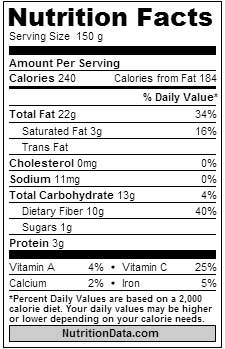Avocados, which are actually classified as a fruit, are rich in monounsaturated fat that is easily burned for energy. Personally, I eat a whole avocado virtually every day, which I usually put in my salad. This increases my healthy fat and calorie intake without seriously increasing my protein or carbohydrate intake. (See Nutrition Facts Panel below.) It is also very high in potassium and will help balance your vitally important potassium to sodium ratio.
As I’ve mentioned before, eliminating grain carbs is one of the best ways to support your health and maintain your weight, but when you cut down on carbs, you need to increase your intake of healthy fats. Avocados are an excellent source, along with organic raw butter, coconut oil, and organic pastured eggs, just to name a few.

There’s also evidence suggesting that limiting your intake of protein can be helpful for long-term good health and the prevention of cancer. At the very least, most people are consuming far too much poor-quality protein, such as beef and animal products from livestock raised in confined animal feeding operations (CAFOs). Here again, if you cut down on protein, you need to replace lost calories with healthy fats such as avocados, coconut oil, olives, olive oil, butter and nuts.
Overall, most people would do well to get upwards of 50-70 percent fat in their diet (along with high amounts of vegetable carbs, moderate-to-low amounts of high-quality protein, and very little, if any, carbs). According to the California Avocado Commission, a medium Hass avocado contains about 22.5 grams of fat, two-thirds of which is monounsaturated. They’re also very low in fructose, which is yet another boon, and provide close to 20 essential health-boosting nutrients, including:
- Fiber
- Potassium (more than twice the amount found in a banana)
- Vitamin E
- B-vitamins
- Folic acid
Avocados are one of the safest fruits you can buy conventionally-grown,and most experts do not believe you need to purchase organic ones. Their thick skin protects the inner fruit from pesticides. Additionally, it has been rated as one of the safest commercial crops in terms of pesticide exposure,3 so there’s no real need to spend extra money on organic avocados, unless you can afford it.
Low Carb Avocado is a multiseries step by step pictured guide on how to create wonderful low carb dishes using avocado.
Here is the seventh series of compilation that will give your low carb diet more delicious and easy options to choose from.

 At some point, many tweens or teens talk about wanting to go on a diet. Maybe they don’t like the way they look in their clothes, or they’re influenced by friends or the ultra-thin models they see in magazines. If your child brings up dieting, it’s a great chance to talk about healthy habits and see how your family can make healthy food and exercise choices together.
At some point, many tweens or teens talk about wanting to go on a diet. Maybe they don’t like the way they look in their clothes, or they’re influenced by friends or the ultra-thin models they see in magazines. If your child brings up dieting, it’s a great chance to talk about healthy habits and see how your family can make healthy food and exercise choices together.



